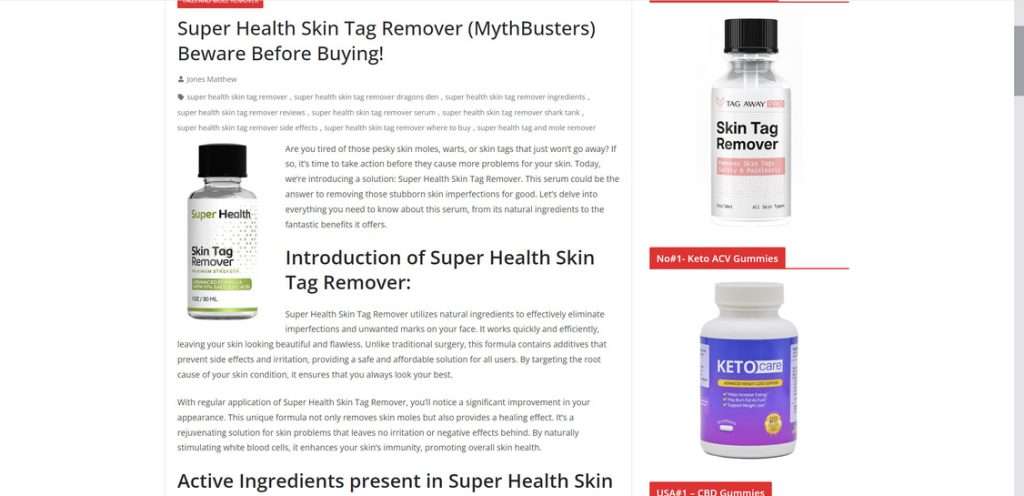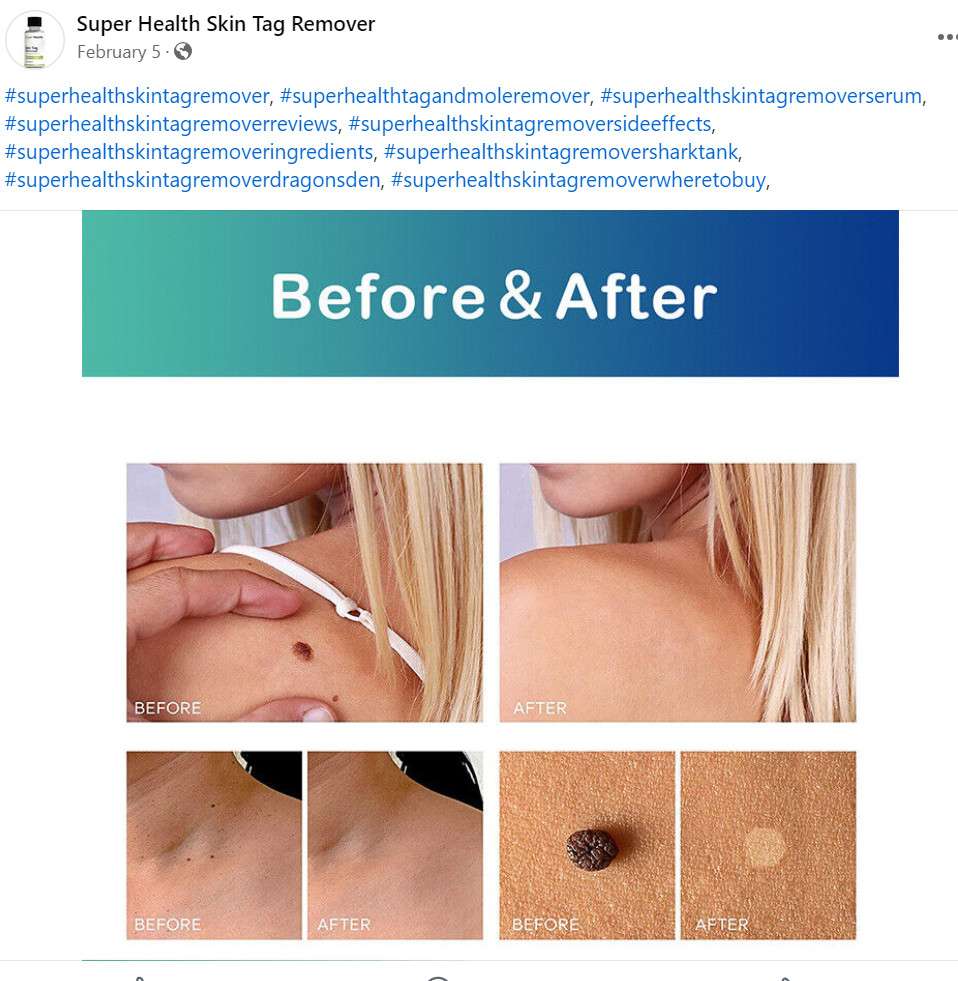Skin tags and moles are common, benign skin growths that can appear anywhere on the body. While usually harmless, they may sometimes become irritated or cosmetically unappealing, leading many to seek removal solutions. This demand has given rise to numerous skin tag and mole removal products that promise easy, painless, and affordable at-home removal. However, not all these products live up to their claims.
One such product garnering attention lately is the Super Health Skin Tag Remover. Advertised as a powerful but all-natural serum that removes skin tags and moles effortlessly within 8 hours, Super Health Skin Tag Remover has been propagated through an aggressive and allegedly deceptive marketing campaign. The campaign uses fake celebrity endorsements and affiliate marketing schemes to promote the product and drive sales through shady websites.
This article will uncover the potentially misleading marketing tactics being employed to promote Super Health Skin Tag Remover, so you can make an informed decision before purchasing.

The Product and Its Claims
Super Health Skin Tag Remover is advertised as a topical serum that removes skin tags, moles, warts and other benign skin lesions. The websites marketing the product claim it contains natural ingredients like sanguinaria canadensis and zincum muriaticum that work to irritate the skin tag, prompting white blood cells to rush to the area and naturally slough off the tag within 8 hours of application.
Removal is touted to be painless, quick, and effective on all skin types. Dramatic before and after photos are displayed showing skin tags and moles disappearing completely. The marketing portrays Super Health Skin Tag Remover as a revolutionary alternative to expensive and painful surgical procedures.
The Shark Tank Celebrity Endorsement Scam
One of the key marketing tactics being employed is the use of fake celebrity endorsements by Shark Tank investors. Numerous advertisements on social media and affiliate marketing websites feature deepfake style videos of Mark Cuban, Kevin O’Leary, Lori Greiner, and other Shark Tank celebrities endorsing Super Health Skin Tag Remover.
The problem? These endorsements are completely fabricated. The Shark Tank investors have no affiliation with or financial stake in Super Health Skin Tag Remover whatsoever. The use of their likeness is an attempt to leverage their fame and reputation to build credibility for an unrelated product.
Mark Cuban has spoken out against this deceptive marketing tactic, stating he receives numerous complaints about fake endorsements daily. Using deepfake technology to falsify endorsements is illegal and unethical.
Other Celebrity Endorsement Scams
Super Health Skin Tag Remover is not the only product using this type of scam. Numerous weight loss gummies, skin creams and other health products are using AI-generated fake videos of Martha Stewart, Whoopi Goldberg, Lainey Wilson, Dolly Parton and more to peddle their wares. These endorsements are entirely fictitious.
The audience these familiar faces provide is extremely lucrative for shady marketers, even if the endorsements are untrue. Experts warn consumers to be skeptical of any unexpected celebrity endorsement online.
Affiliate Marketing Schemes
Another concerning aspect of Super Health Skin Tag Remover’s promotion is the affiliate marketing system driving sales. Affiliate marketers aim to earn commissions by driving traffic to merchant websites and getting users to make purchases.
Numerous affiliate marketers are promoting Super Health Skin Tag Remover across social platforms and ad networks, using fabricated reviews, before/after images, and celebrity deepfakes to entice clicks. They care more about their commission payouts than providing honest information.
The affiliate links generally direct users to shady landing pages with questionable sales tactics, like:
- Countdown timers and claims of “limited supply”
- Fake reviews and testimonials using stock photos
- Requirements to enter personal details before seeing the price
- Upsells, auto-renewal subscriptions, and other tricks to maximize spending
The marketing aims to pressure and mislead people into purchasing before thinking critically. The focus is on driving sales, not informing.
No Credible Information on the Manufacturer
Another red flag is the lack of information about Super Health Skin Tag Remover’s manufacturer. Marketing pages claim it is made in an FDA-approved facility in the United States, but the manufacturer is never identified.
Searching online yields no credible information about the company behind Super Health Skin Tag Remover. No business filings, company history, or FDA documentation can be found.
A legitimate health product should have clear documentation of its manufacturing, testing, and company background. The lack of transparency around the manufacturer raises further questions.
Customer Complaints of Ineffectiveness and Being Overcharged
While affiliate marketers and shady websites portray Super Health Skin Tag Remover as highly effective, genuine customer feedback tells a different story.
Numerous complaints have arisen about the product simply not working as advertised. Customers report applying it properly for weeks with no visible skin tag removal.
Worse, many customers find themselves overcharged for multiple bottles they never wanted. The free trial terms were buried in fine print, and people were unexpectedly sent more product and auto-billed every month. Canceling these subscriptions proved extremely difficult.
The company appears far more concerned with maximizing recurring revenue than product efficacy or transparency. These types of shady billing practices and product exaggeration are common traits of a scam.
Lack of Evidence for the Product’s Efficacy and Safety
Nowhere on the marketing pages can you find credible evidence that Super Health Skin Tag Remover is clinically proven to safely and effectively remove skin tags and moles. No clinical trials, scientific research papers, or dermatologist recommendations are cited.
Given how revolutionary the product claims are, this lack of proof is highly suspect. Additionally, while “natural ingredients” are touted, their concentrations and potential side effects are never addressed. No warnings about use during pregnancy or for people with certain skin conditions are provided either.
There is also no evidence showing Super Health Skin Tag Remover has been properly evaluated by health authorities. No FDA registration or oversight is mentioned.
Without sound scientific evidence of efficacy and safety oversight, the grand claims being made ring hollow.
How to Protect Yourself from Skin Tag Removal Scams
The concerning indicators around Super Health Skin Tag Remover point to an unreliable product surrounded by deceptive marketing tactics. To avoid falling victim to such scams when seeking skin tag removal solutions, keep the following tips in mind:
- Verify celebrity endorsements. Be skeptical of any unexpected celebrity promotion. Search their official website and social media to confirm they have disclosed the endorsement.
- Research the manufacturer. Dig into their reputation, qualifications, and transparency around ingredients, testing, and health authority oversight.
- Avoid shady websites. Don’t trust landed pages with countdown timers, fake reviews, or pressure to enter personal details.
- Watch out for upsells and subscriptions. Many scam sites trap customers with recurring monthly shipments and billing without consent. Read the fine print carefully first.
- Check with your dermatologist. Get professional advice on proven skin tag removal options before trying any product. Many are not supported by science.
- Read impartial customer reviews. Scam products generally have no reviews outside their own marketing materials. Look for honest feedback on third-party review sites.
- Beware dramatic claims. Heavily marketed products touting revolutionary results fast are often too good to be true. Achieving real skin tag removal takes time and care.
Here is a detailed, SEO-optimized FAQ on the Super Health Skin Tag Remover scam:
Frequently Asked Questions About The Super Health Skin Tag Remover Scam
1. What exactly is Super Health Skin Tag Remover?
Super Health Skin Tag Remover is a topical serum advertised online and through advertisements as removing skin tags, moles, and blemishes easily within 8 hours. It is marketed as a natural, revolutionary alternative to surgical procedures. However, evidence indicates it is a scam product surrounded by deceptive marketing tactics.
2. How is Super Health Skin Tag Remover promoted?
Super Health Skin Tag Remover is primarily promoted through fake celebrity endorsements, affiliate marketing schemes, and shady websites.
Numerous online ads feature deepfake videos of Mark Cuban, Kevin O’Leary and other Shark Tank investors endorsing the product. In reality, these celebrities have no association with Super Health Skin Tag Remover.
Affiliate marketers also promote questionable landing pages using fabricated reviews, dramatic claims, and pressure tactics to get users to purchase the product.
3. What ingredients are in Super Health Skin Tag Remover?
The marketing claims the product contains natural ingredients like sanguinaria canadensis and zincum muriaticum. However, no research is cited showing these ingredients can safely and effectively remove skin imperfections. The concentrations and potential side effects of the ingredients are also never revealed.
4. Is Super Health Skin Tag Remover FDA-approved?
There is no evidence showing Super Health Skin Tag Remover is registered with the FDA. No details about the manufacturer, scientific research, or health authority oversight are provided either. The lack of transparency is a major red flag.
5. Does Super Health Skin Tag Remover really work?
Despite the dramatic claims and before/after photos used in the marketing, multiple customer complaints suggest the product does not work as advertised. Many report applying it properly for weeks with no change to their skin tags or moles. The product appears ineffective.
6. What are the billing practices like?
Numerous customers report being unexpectedly charged for multiple bottles of Super Health Skin Tag Remover due to confusing free trial and subscription policies. Canceling these recurring shipments and charges is made very difficult. Unethical billing practices are commonplace.
7. Is Super Health Skin Tag Remover recommended by dermatologists?
There is no evidence of any dermatologist endorsements or recommendations for Super Health Skin Tag Remover. Dermatologists typically recommend proven medical procedures over unverified internet products for skin tag and mole removal.
8. Is Super Health Skin Tag Remover safe?
Without reputable scientific research on the formula and manufacturer, the safety of Super Health Skin Tag Remover is highly uncertain. There are risks associated with applying untested ingredients to skin imperfections. Consult a doctor before trying.
9. Are the reviews for Super Health Skin Tag Remover real?
The reviews on affiliate marketing pages appear fabricated. All provide glowing praise with stock photos of models. Searching major review platforms yields almost no impartial customer feedback. The reviews cannot be trusted.
10. How can I avoid skin tag removal scams?
Stick to products and procedures verified by scientific research and your dermatologist. Beware celebrity endorsements, dramatic claims, and fake reviews. Read the fine print carefully before purchasing. Check the company reputation thoroughly first. Prioritize your skin health.
11. What are better options for removing skin tags?
Proven medical procedures like cryotherapy, electrocautery, surgical excision performed by a dermatologist offer reliable skin tag removal. Some home remedies like apple cider vinegar and tea tree oil may work over time. Always consult a doctor first.
In Summary
Super Health Skin Tag Remover is surrounded by concerning marketing tactics, exaggerated claims, a lack of transparency, and customer complaints. All signs point to an unreliable product not worth your money or skin health.
Rather than waste time and money on a potentially shady serum, consult a dermatologist. Professional medical procedures have a long track record safely removing skin tags and moles with minimal discomfort and optimal results.
Your skin health is precious – don’t put it at risk unnecessarily. Make informed choices backed by medical science. Avoid trap schemes using celebrities and fake reviews to peddle products lacking evidence.
And remember – if a skin removal solution seems too good to be true, proceed with the utmost caution. Your skin integrity is on the line. Trust dermatology, not deception.
This article is for educational purposes only and does not constitute professional, financial or legal advice. The content is intended for general information and should not be construed as definitive guidance. Information contained herein is subject to change without notice. For concerns, please contact us via the provided form.
If you are the owner of the website or product in question and wish to offer clarifications regarding your business or website, please reach out to us through the provided Contact Form.




![Remove News-mifage.com Pop-up Ads [Virus Removal Guide] 8 McAfee scam 4](https://malwaretips.com/blogs/wp-content/uploads/2023/08/McAfee-scam-4-290x290.jpg)
